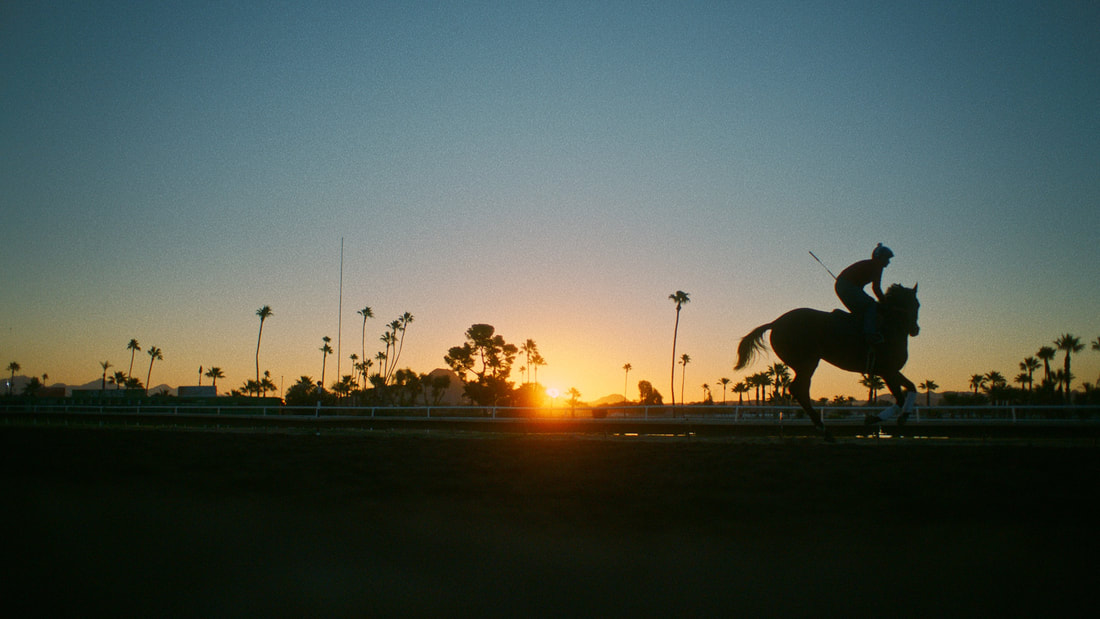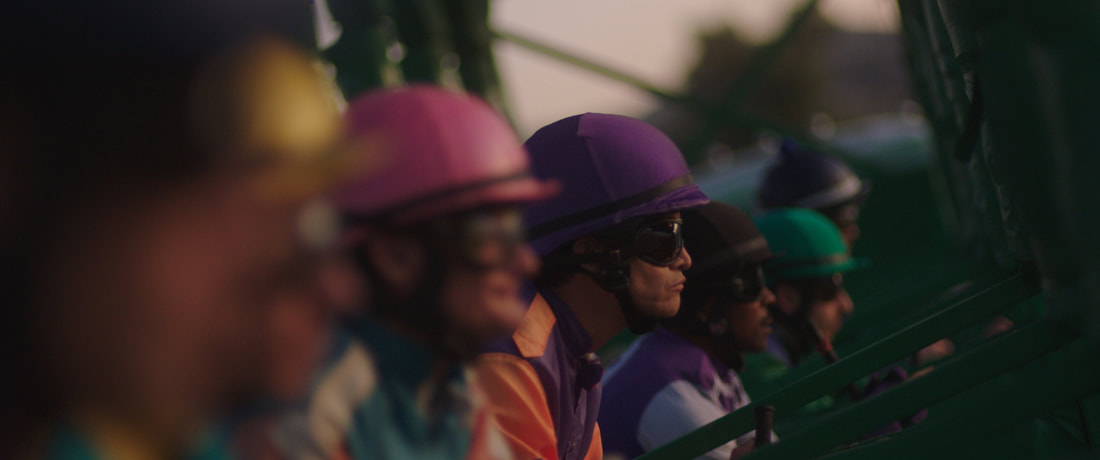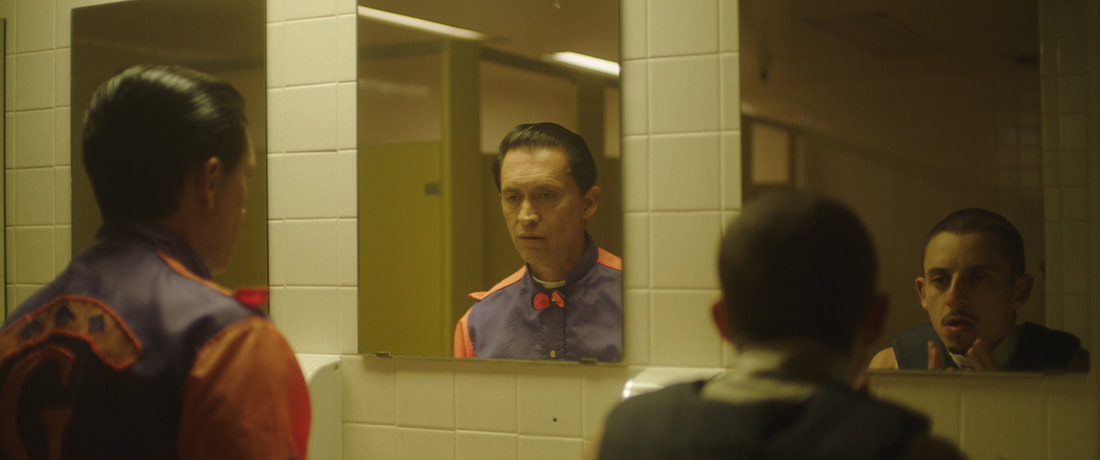|
Interview by Dan Skip Allen
Jockey debuted at the 2021 Sundance Film Festival, where it was picked up by Sony Pictures Classics for a release in the thick of awards season. And while the sports genre is known for its saccharine crowd-pleasers, Clint Bentley's film takes a unique approach, both narratively and stylistically. We at disappointment media got the chance to talk with the film's director, Clint Bentley about his approach to making this film. Check out the interview below!
On Telling the Film's Story
disappointment media: What about the sport of horse racing stood out to as something you wanted to make a film about?
Clint Bentley: Actually, my dad was a jockey, and so I grew up in the world of horse racing, and I grew up behind the barns. And it really, it didn't seem that weird as a kid, because I had just grown up in it. But then, when I got a little older and became a filmmaker, I realized just what a strange, interesting kind of carnie life they lead, specifically jockeys and how I hadn't seen that really on film. And so I wanted to portray that. disappointment: Aging is a big part of a lot of people's lives. But how important was it to use this angle as part of Jackson Silva's life and struggles? Bentley: Yeah, it became something that my co-writer and co-producer Greg Kwedar and I were working on the script. And early on, the script was about a younger jockey. And Jackson was a supporting character in those earlier ideas of the movie. But then, he really hit on the idea that what Jackson is going through as a character, in this kind of aging out but not being ready to go and being used up but still having a lot of passion for this world is very similar to what the sport of horse racing is going through in general. And it kind of acts as a perfect metaphor for it. So we just leaned into that. On the Film's Unique Style
disappointment: The racing scenes are definitely unique within the genre of sports movies. What did you do to create the visual style in these portions of the film?
Bentley: Yeah, as I was doing doing early directing prep, I took all of the horse racing movies, and I pulled their races out. And then I cut them up in an editing program, in Premiere, to see like, "Okay, what was their shot selection in making these?" And what I found was like, they were all shot and cut exactly the same. And I couldn't tell once I got them all pulled apart and started putting them together, I couldn't tell which movie was this even from. And I just think that's because like, they only go one direction and there's only so many ways you can shoot it. But then once I got to a place where we were actually making the film, we didn't have much money, we had a very small crew. There wasn't really a way to safely do, even if I wanted to do a big race scene, there wasn't a way to safely do it. And so, you know, I really worked closely with Adolpho Veloso, my cinematographer, and we just tried to figure out, "Okay, if we can't do this and make it feel big in the way that we would normally see a race, how can we do in an interesting way?" And locking it close in on Jackson's perspective just fit the story. And so we were doing all sorts of these little tricks throughout, just to use our limitations to our advantage. And it helped to be on a live working racetrack where races were happening all the time. And we could just film our actors around it, you know? disappointment: The score by Aaron and Bryce Dresner is excellent. How did you work with them to create a sound for the film? Bentley: Greg and I had worked with them on our first film, Transpecos. And so we had a bit of a personal history there and a connection. And then when it came time to do this one, I really wanted a score that, like the movie, it had to kind of walk a tightrope where it I wanted it to be big and emotive, but not too big and kind of saccharin. But then be atmospheric but also not too slight. And Aaron and Bryce are just brilliant. They're brilliant composers. And once we kind of talked about the feelings that I wanted to get across with with not only the movie, but each scene, they just really ran with it and created something really beautiful. And also, they created in a way that was very scrappy, kind of like the way we shot the movie. On Realism in Cinema
disappointment: One of my favorite scenes in the film is the therapy session, how did you get the guys in the
scene to tell such realistic stories? Bentley: Yeah, I love that scene, too. It's funny, there's such a oral history tradition, for lack of a better word, in that world of, they're always just sitting around telling stories because there's so much downtime between between their work. But the ideation of it was that I wanted to get certain things across about the world, and certain information that you just could never put into dialogue, because it would sound so cheesy. But as soon as you let them say it in their own words, they say it beautifully, and get so much more across than Greg or I ever could by writing it. And so that was just a case of just putting them in a room together, getting them comfortable, and they opened up. They opened up beautifully. And we had been there a couple of weeks by that point, so they they had our trust, that we weren't going to abuse that trust. disappointment: Jockey offers an intimate and realistic look at the horse training world and you yourself have some personal experience in that industry. Why did you really want to emphasize on the realism of this world? Bentley: I think partly, it's just my sensibilities as a filmmaker. And the kind of stories that I want to tell and the way I want to move to feel. And so, you know, just in general, that was my inclination. But then also, just in terms of this world, we had seen horse racing movies so many times that were that were kind of glamorized and Disney-ized. And not that those are bad things, but that that's just the representation we had seen. And I really wanted to just give a very realistic portrayal of it with with all of its beauty, but also all of its warts as well.
Jockey hits theaters on December 31.
0 Comments
Leave a Reply. |
Archives
March 2024
Authors
All
|
|
|
disappointment media
Dedicated to unique and diverse perspectives on cinema! |



